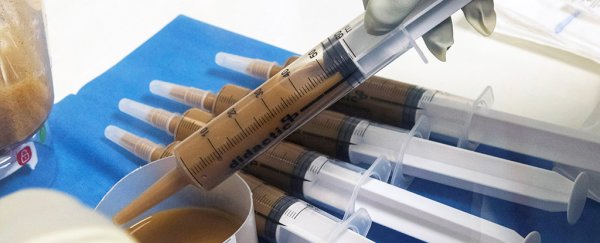Scientists will soon begin proper clinical trials to see if poop transplants really can help people recover from COVID-19.
The decision was spurred on by curious results from two recent hospital patients in Poland - an 80-year-old man with pneumonia, and an immunosuppressed 19-year-old man - who both received fecal transplants for severe C. difficile infections.
Unbeknownst at the time, these patients also had COVID-19. Its symptoms began to show up shortly after the two received their poop transplant, and yet even though both individuals were particularly vulnerable to SARS-CoV-2, their cases were only mild and their fevers cleared up within just a couple days.
There's no way to know how either would have coped without the poop transplant, so it's hard to pin down their fast recovery to any one source. That said, the coincidence is intriguing enough for scientists to investigate further.
After all, this isn't the first time experts have proposed using poop transplants to treat COVID-19. A person's gut microbiota is closely linked to their immune system, and COVID-19 can cause distinct disturbances in the gastrointestinal tract.
Some other initial reports suggest poop transplants can somewhat restore the balance of gut bacteria after COVID-19, but nobody has yet done any hard investigations on whether the treatment is useful clinically or even safe.
Poop transplants are carefully screened for infections when used as treatment, but there's always the chance some dangerous pathogen sneaks through, and in a global pandemic that prospect is even riskier.
Nevertheless, researchers think the two rapid recoveries in Poland are promising enough to merit further exploration. Most patients who develop COVID-19 show evidence of the virus in their feces for roughly 28 days, but in these two recent cases, the viral matter disappeared from stool samples much faster.
The 19-year-old, despite having a compromised immune system, wasn't even treated for the SARS-CoV-2 infection; he simply got better on his own within a day.
Meanwhile, the 80-year-old patient was given a cutting edge treatment that usually takes about 10 days to kick in. Two days after receiving a poop transplant, his fever broke and never recurred again.
"Our main conclusion from these cases is that a fecal microbiota transplant appears safe and of comparable efficacy in treating recurrent C. difficile infection in patients with coexisting COVID-19," the researchers write in a letter describing the case.
"A further more speculative question is whether a fecal microbiota transplant may impact the clinical course of COVID-19."
It's possible, for instance, that poop transplants could boost the immune system in those with COVID-19, triggering a cascade of molecular changes from the presence of certain bacteria.
Some research even suggests the gut's microbiome can impact the respiratory system; in turn, this could boost the lungs' resistance to COVID-19.
We still know surprisingly little about how the gut impacts the immune system, or how poop transplants ultimately may contribute to the process, but it's worth investigating if this treatment really can help us clear severe viral infections. The authors of the current letter intend to begin recruiting for their clinical trials shortly.
The case study was published in Gut.
